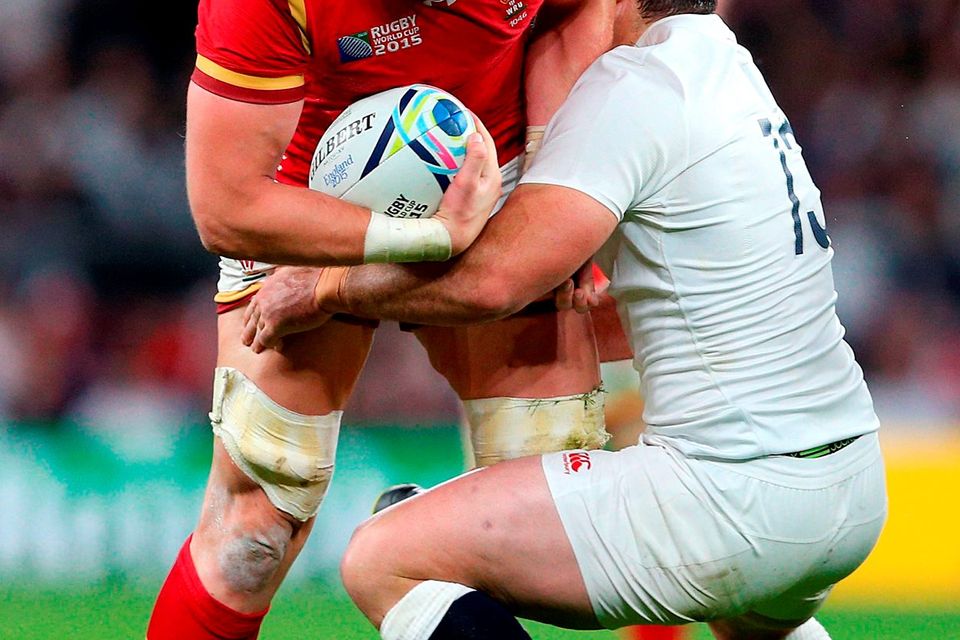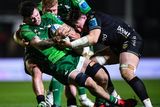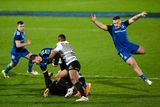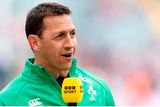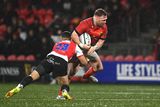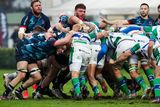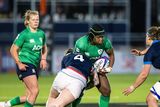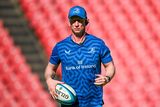Key man Jones living up to impression made on day O'Driscoll was dropped
Alun Wyn Jones has been a standout performer for Wales
As Wales and Australia get ready to do battle in the decider of their group, the focus has been on their back-rows. World-class disrupters, grapplers and linkers, they have been central to the performances that ruthlessly ejected the hosts from their own party.
But there is a man lurking in the front five who I have come to respect probably more than any other on a rugby field, and who will be just as important: Alun Wyn Jones. Measured and composed, an athlete and a warrior, the second-row's style on the field is mirrored off it.
I had always known what a quality performer he was, the type who almost never has a bad game, or goes missing. This was reinforced on the Lions Tour of 2013.
Days before the decisive third Test against Australia, the unthinkable happened. Brian O'Driscoll was dropped by Warren Gatland, left out of the match-day 23 completely. Cue media frenzy.
Into this stepped Jones as captain in his first press conference. Everything was dealt with calmly and assuredly. Jones acknowledged the size of the call and then put it to bed. Here was a man at peace with himself, the decision, and the team he had around him.
Then he led his team to a remarkable victory, putting in captain's carries time and again.
At a time when many are questioning the lack of leadership in England's team, Wales are a reminder of how vital it is, and how lucky they are to have a number of players who are all able to lead and do what is required to win a match.
If we look past the breakdown for a moment, where Sam Warburton will have to deal with David Pocock, the architect of England's downfall, then Jones is the central figure.
Jones is a clever manipulator of the line-outs. He will make the right call on his own ball, and will take an educated guess on the opposition's.
At restarts, Jones more often than not finds himself under the ball, bodies hunting him down. He is also a hugely effective kick-chaser.
At the breakdown, Jones will be crucial in the way Wales have to keep the ball away from the voracious Australian 'fetchers', Pocock and Sean McMahon, who is playing in the absence of the suspended Michael Hooper.
Australia are disciplined, they do not dive in at every breakdown. Their ratio of going for it and getting the turnover is high because they trust their multi-phase defence.
England used too many carriers who looked for the safety of the turf too early and it gave the Australians the chance to use their upper-body strength. Pick any of the roll/flip/tackle/bump and push down, it does not matter, because more often than not they find themselves on top of the grounded man. They are then in and over and causing trouble.
I spent nightmarish afternoons being chased around the park by the originator of this style, Phil Waugh. He was the prototype, with George Smith following. Pocock, though, has taken it on a level. Arms like Popeye, flexibility of Indra Devi, Pocock is a force of nature that needs to be combated - and that is where Jones can playing a starring role.
First, he has incredible fitness and work ethic. With Pocock around, Wales can never leave a man isolated when carrying into Australia's players. The Wallabies wait and pounce.
Wales will need to keep working throughout the game. They cannot worry about two phases later or the ever-present ball-snaffling danger. Clearing out and supporting is the bread and butter of the front-five and few do it consistently better than Jones.
Second, he uses his brain. At some point, no matter how quick or high the work rate, a player will become isolated. Things go wrong, and what Wales do to limit the danger will be key.
With players such as Pocock and Scott Fardy, if you are running with the ball, if you are moving towards contact, the worst thing you can do is charge in at full tilt, thinking "smash time".
It is what they want, to use your momentum against you. Your weight and power becomes your own worst enemy. Wales need to understand that in rugby there is often nothing wrong with the occasional Mexican stand-off. Relax, take the pace out of the charge and buy time for your pals to arrive. England did not, and they got turned over.
Third, Wales will need to have their big forwards running and making gain lines. In recent seasons, Jones has taken this part of his game to the next level. He has comfort on the ball and an ability to handle and offload.
The most obvious way to keep Pocock out of the game is to keep the ball off the deck. Easier said than done, and it is difficult suddenly to decide on a Monday that you need to become an all-court team by Saturday.
But across their pack Wales have men comfortable with ball in hand. Jones is as good as any second-row in the world, although perhaps Fiji's Leone Nakarawa is top of the list.
Finally, the area where Jones can have an impact is in the way Wales face up to Australia. They are seen as the underdogs; their record against the southern hemisphere sides is brought up every time they face Australia, New Zealand or South Africa. Lose again, and the odds are stacked against them. No team have ever won the World Cup from second place in the group.
Wales need their big players to lead, to play with purpose and accuracy, to add control and temperament, and to flog themselves to a standstill for the cause. No-one does that better than Alun Wyn Jones.
AUSTRALIA - I Folau; A Ashley-Cooper, T Kuridrani, M Giteau, D Mitchell; B Foley, W Genia; S Sio, S Moore (capt), S Kepu; K Douglas, D Mumm; S Fardy, S McMahon, D Pocock. Reps: T Polota-Nau, J Slipper, G Holmes, R Simmons, B McCalman, N Phipps, M Toomua, K Beale.
WALES - G Anscombe; A Cuthbert, G North, J Roberts, L Williams; D Biggar, G Davies; P James, S Baldwin, S Lee; L Charteris, A Wyn Jones; S Warburton (capt), J Tipuric, T Faletau. Reps: K Owens, A Jarvis, T Francis, J Ball, R Moriarty, L Williams, R Priestland, J Hook.
Australia v Wales, Live, TV3/ITV, 4.45
